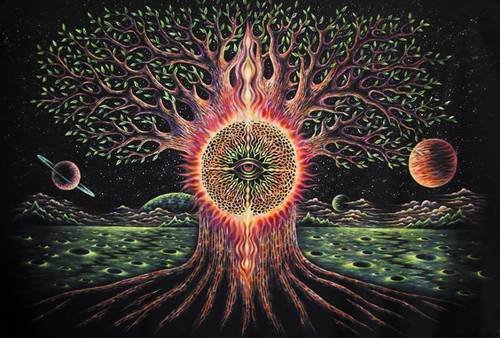Imagine a tree in a valley. In this metaphor, this tree is reality. Everything about this tree, from the branches, to the trunk, to the roots – everything – contains everything there is to know about our universe.

We, being life, get a perspective of the tree from wherever we're standing. We can shift our place around the tree to gain a different perspective, but ultimately we can only see a portion of the tree at any given time.
We, being human beings, have a tremendous capacity to see the tree. While others animals meander freely around the base of the tree, we are perched high on a nearby hill. From our vantage point, we have incredible insight of our reality.
Yet, we still are limited. In some ways, even more so than our animal cousins. They are not tied to their perspective, and can wander freely around the tree. Since our hilltop perspective is so advantageous for us, we grow attached to particular hillsides. And regardless of how high we climb, there will always be another side of the tree that we cannot observe from where we are.
In this metaphor, the hill we reside on is our paradigm, and our attachment to our particular hillside is caused by our egos. We have a tendency to trick ourselves into forgetting the other people on other hills have an equally valid take on the real world, and that our perspective is never a complete picture.
Despite our individual paradigms being fallible, consider this: none of us are an island. We are connected to each other, sharing information about our personal worlds. Like people calling out across the valley, our collective tribe shares a 360 degree perspective of reality.
Some of us have a great ability to share this information, others have phenomenal vision and can see the details of the tree far more clearly than others. Working together, the poets and scientists of humanity can bring wisdom to everyone.
Another thing to think about: while our position has its strengths in viewing the tree, we have lost connection with the roots as a result. There is a whole other layer of reality that our brains can't fully understand. We can theorize and creating accurate models about what lies under the surface of the tree, but we have removed ourselves from the Earth we grew from.
Even worms know things about existence that are lost on us.
podemos concluir que todos los seres humanos estamos conectados eso no significa que pensemos de la misma manera por eso el mundo es mundo cambiante y dinámico con muchas facetas hay que ver mas alla y no olvidarnos de nuestras raíces nunca
Hey there i-juggler, how did you arrive at this information if you don't mind me asking?
It's mostly self-generated through meditation, thought experiments, and from an assortment of knowledge absorbed from philosophy and the cognitive sciences. About seven years ago I began my journey through philosophy, then theology, and then the esoteric, while absorbing a ton of information about human scientific advancement.
The information presented in this metaphor isn't anything new. Kurt Godel's incompleteness theorem is the pinnacle of this information; that none of us can construct a complete axiomatic system (paradigm) by the nature of logic as we know it. Thinking farther back, the idea of having a limited model of reality has roots from Plato, if not beyond then.
Interesting, same here. Perspective and reality, it's a confusing duality.
a beautiful presentation thankyou🤗🤗
Nice!
✨
Nice metaphor @i-juggler, it's an important lesson that we all need to come to understand.